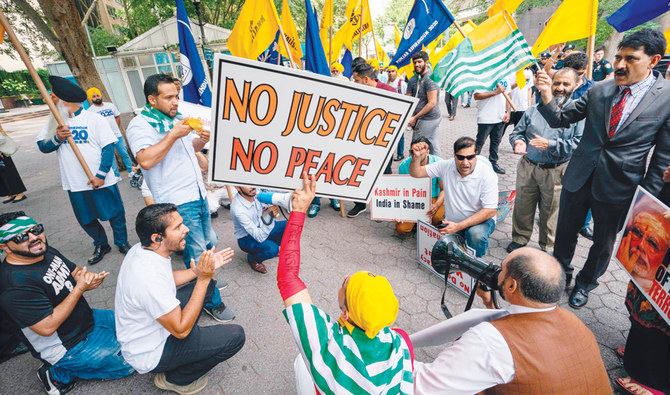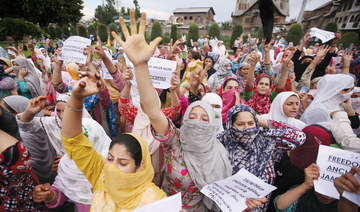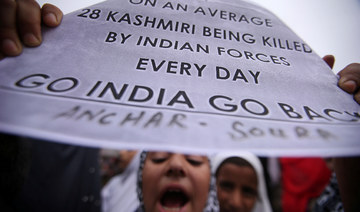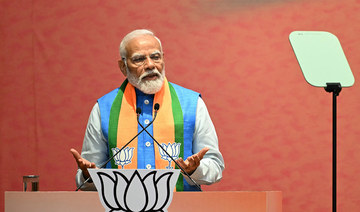ISLAMABAD: Pakistan’s Foreign Minister Shah Mahmood Qureshi has described the UN Security Council (UNSC) session on Kashmir as a “huge diplomatic development.” Qureshi said that it was the first time in more than 50 years that the council took up the issue and focused on the disputed region.
“It nullifies New Delhi’s claim that Kashmir is India’s internal issue and amplifies Islamabad’s viewpoint that this is an internationally recognized dispute since there are 11 Security Council resolutions on the subject,” he told Arab News in an exclusive interview.
“India’s claim has gone out of the window: The fact that the Security Council is taking up the Kashmir issue for the first time after the 1965 war makes it a huge diplomatic development. It also internationalizes the Kashmir issue once again,” he said.
The foreign minister said that his country expected UNSC member states to play their role to ensure peace and security in the region and avert a humanitarian disaster in Indian-administered Kashmir.
“We expect different departments of the (UN) secretariat to make presentations and brief security council members (on the situation). We hope that the latest report of (the United Nations Military Observer Group in India and Pakistan) is discussed. We expect that the UN Human Rights Commissioner’s reports, which were made public in June 2018 and in July 2019, are also to be discussed,” Qureshi said.
The UNSC held a special session in New York on Friday to discuss the situation in Indian-administered Kashmir. Earlier, China echoed Pakistan’s demand for a UNSC meeting, asking for the world body to gather “behind closed doors.”
Qureshi said that Pakistan and India would not be included in the UNSC meeting. “In a closed-door meeting, only 15 members of the Security Council participate and no outsiders are invited,” he said.
HIGHLIGHT
Shah Mahmood Qureshi likens the revocation of Article 35 A to Kashmiri ‘genocide’ since it seeks to forcibly ‘turn a majority into minority.’
The foreign minister said that this was the first step, adding that the situation in Kashmir was evolving and could lead to an open debate as well. “If there is an open debate, Pakistan and India will also be invited,” he said. “At this stage, it was felt that their participation would only lead to confrontation and disturb the environment of the Security Council. So, (the UN authorities) wanted in their wisdom to dispassionately look at the situation which, everyone agrees, is quite grave.”
Qureshi said that the UNSC meeting was the result of his letter written to the UNSC president on Aug. 13.
“Today is the 12th day of the curfew,” he said. “There is a total media gag, communications blackout, internet services have been suspended, journalists are not allowed to perform their job, civil society activists are not allowed to go to Jammu and Kashmir.”
The Pakistani foreign minister said that Kashmiris across the political spectrum had rejected India’s unilateral revocation of Article 370.
“Kashmiri politicians, who previously operated within India’s political system, also called the step a betrayal. Everybody has rejected it,” he said.
“Kashmir has been forcefully annexed,” Qureshi said. “India is an occupying force in Jammu and Kashmir.” He said when New Delhi lifted the curfew, people would naturally express their anger at its decision to change Kashmir’s status earlier this month.
“That reaction will be met by suppression and that suppression will lead to a bloodbath. The removal of Article 35-A is an attempt to bring about a demographic change (in the region). This in itself is a form of genocide, where a state is forcibly trying to turn a majority into a minority.”
Qureshi said that a constant consultation was going on in his ministry to examine all possible options. Later in the day, he held a lengthy meeting with leading experts on Kashmir.
The foreign minister also said that he would chair a meeting of a special committee constituted by Prime Minister Imran Khan tomorrow to take a closer look at the situation.
“All civil and military stakeholders will be present (at the meeting) and we will assess and discuss the situation. We will also decide what next steps to take in the coming days,” he said.


























